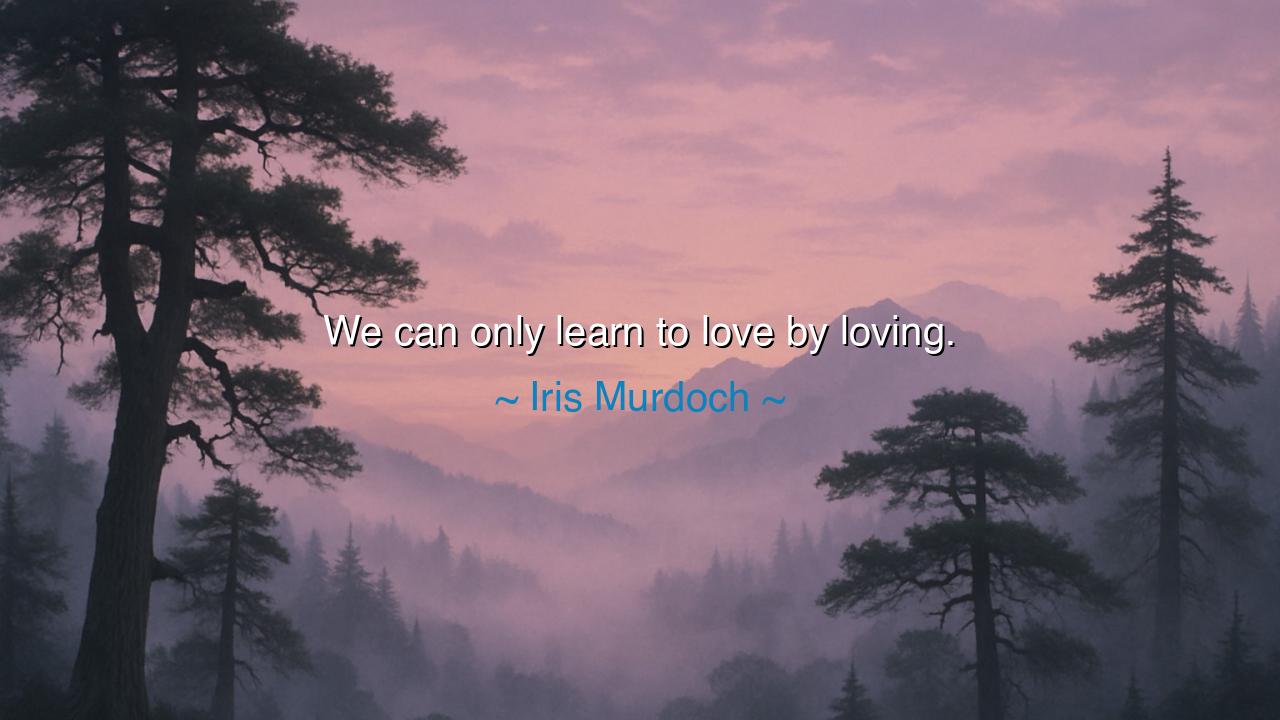
We can only learn to love by loving.






When Iris Murdoch wrote, “We can only learn to love by loving,” she distilled into one radiant truth the essence of both philosophy and human experience. Murdoch, a philosopher and novelist of extraordinary insight, believed that love is not a concept to be studied, defined, or dissected—it is a practice, a way of being, a sacred labor of the heart. Her words remind us that no amount of reasoning or observation can teach us what love truly is. One must enter into love, live it, struggle with it, and be transformed by it. Just as one learns to speak by speaking or to play music by playing, one learns to love only by loving.
Murdoch’s philosophy arose from her lifelong quest to reconcile intellect and goodness. She rejected the notion that love is merely a feeling or a moral idea. For her, love is an act of unselfing—the movement of the self away from ego, illusion, and desire, toward the reality of another being. To love is to see another person not as an extension of one’s own needs, but as something infinitely valuable in itself. But this sight, she believed, cannot be achieved through mere contemplation—it must be practiced. Each act of patience, forgiveness, tenderness, or sacrifice becomes a lesson in love. The heart learns what the mind cannot grasp.
The meaning of this quote runs parallel to the ancient teachings of the sages. The Buddha spoke of compassion as a path, not a destination; one becomes compassionate by practicing compassion. The apostle John wrote, “He that loveth not knoweth not God; for God is love.” The philosophers of old, from Plato to Augustine, taught that love is the highest education of the soul. Murdoch, standing among them, gave this truth a modern voice: that we cannot know love by analysis—we can only know it by experience, by living it out in the messy, imperfect world.
History offers luminous examples of this truth. Consider Mother Teresa, who did not study love in books, but in the faces of the dying and the abandoned. She began by loving one person, then another, and another—until her life itself became a school of love. Through each act of service, she learned more of love’s depths and demands. Or think of Nelson Mandela, who, after twenty-seven years in prison, chose forgiveness over vengeance. His love for humanity was not learned through comfort, but through suffering—and in that crucible, his heart was schooled in greatness. Both lives testify that love is not an emotion we stumble upon; it is a discipline, refined through action and endurance.
To learn to love by loving also means embracing the humility of failure. No one loves perfectly. We stumble, we wound, we fall short. But every honest effort enlarges the heart. Love, like art, is practiced into existence. The sculptor must carve away stone to reveal form; likewise, love carves away selfishness, pride, and fear until only truth remains. The act of loving—through kindness, service, or forgiveness—slowly reshapes us. We do not become lovers by waiting for perfection, but by engaging the imperfect world with compassion.
Murdoch’s wisdom also calls us to love beyond sentiment. True love is attention. It asks that we look beyond ourselves to see the realness of another—another person, another creature, even the fragile beauty of the world. To love in this way is to awaken from the dream of self-centeredness. The lover does not say, “What can I gain?” but “What can I give?” And in giving, the soul expands. Love teaches not through reward, but through transformation.
So, my child, remember this: to love is to learn, and to refuse to love is to remain ignorant of life’s deepest truth. Do not wait until you feel ready; do not seek a perfect moment. Begin where you are. Love someone undeserving. Forgive someone difficult. Care for something fragile. Each act will teach you what no philosophy can. The more you love, the more your soul will understand the divine rhythm that moves all creation.
Thus, as Iris Murdoch reminds us, “We can only learn to love by loving.” It is not knowledge written in books but in the heart, not learned in solitude but in service. To love is the greatest education, the only path that leads us beyond the limits of self into the vastness of eternity. Love, practiced sincerely, becomes both the journey and the destination—the one lesson that, once learned, redeems all others.






AAdministratorAdministrator
Welcome, honored guests. Please leave a comment, we will respond soon